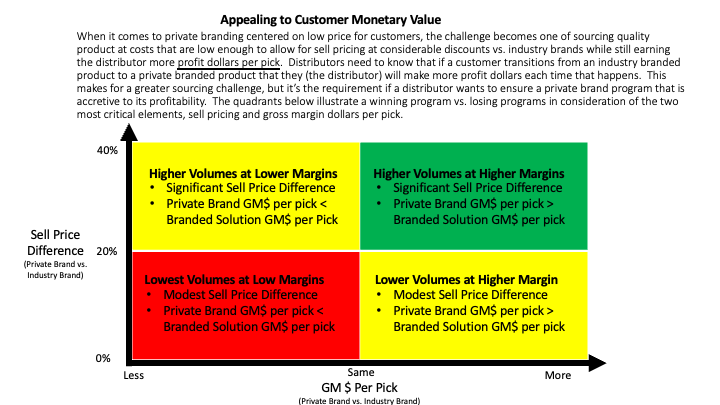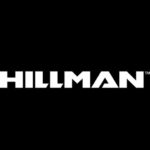Successful Category Management starts and ends with creating real value for the customer. Distributors get into trouble when they prioritize their own interests over the interests of the people who buy from them. A perfect example is private branding.
Overwhelmingly, distributors choose to pursue private branding programs to increase their profits. They see organizations achieving 40% or 50% gross margins (sometimes higher) and say to themselves “I want that too!”
The potential for profit improvement through effective private branding is undeniable. But for private brands to bring true and sustainable profit improvement to the organization the programs need to be done right. And doing it right means adopting private brand strategies that create real value for customers. There are typically three forms of value that customers experience:*
- Monetary Value (product price)
- Functional Value (product performance)
- Psychological Value (emotional attachment)
Let’s take a deeper look into each of these values with specific reference to private branding.
Monetary Value
Most distributors choose to develop private brand programs centered on low price, offering their customers product options that are significantly less expensive than the industry brands they carry.
These organizations often source the least expensive products they can find, put a label on them, and – voila! – they have a private label program. Not surprisingly, this approach is the least profitable and least sustainable. If customers are buying something today primarily because they want it cheap, then the minute they see a less expensive product somewhere else, they will go there to buy it.
Additionally, despite what can be impressively high margins, selling products for less money generally brings less profit dollars, and it’s the dollars – not percentages – that lead to true profitability. So, unless your organization is set up to win by competing aggressively on price every day and can do so while still being accretive to your profitability (think Walmart), a program appealing exclusively to customers’ monetary value may not be the best one for your organization to pursue.
See the quadrant graphic below for some basic yet critical profit modeling concepts that can be helpful in positioning private brand programs for success.
Functional Value
Studies – and common sense – reveal that customers want products that work, and they are willing to pay more for them. The good news for private brand programs is that manufacturing capabilities have increased globally. Products and their manufacture have become much more commoditized than in the past. Higher and more consistent quality is more readily available at lower costs, and as a result, a solid price/performance balance has become the expectation of most end-users.
When distributors begin to focus more on value through product quality and consistency, they begin to lay the groundwork for what will likely be a more successful, sustainable and profitable private brand program. Playing in this space requires better and more thorough sourcing and supplier management capabilities to ensure that quality, consistency, and availability are up to par. If the commitment and discipline is not there, this approach will fail.
Psychological Value (Emotional Attachment)
When it comes to branding, achieving customer emotional attachment to a brand is the holy grail for marketers. Customers will not only be loyal to the brand but will also – in many cases – be willing to pay a premium for it. As a result, this is the most profitable and sustainable customer value around which to build a private brand strategy, but it also requires considerably more marketing savvy than the other two.
Certainly, product quality, features and benefits are a part of the formula for success here, but it goes beyond those physical attributes. It might be the product messaging or design elements, associations with certain influential people or a storied history among other factors that create strong positive association with a brand.
As you might expect, being successful at this approach requires not only strong product development and sourcing skills but also superior marketing and brand management capabilities to build the confidence and emotional appeal that will compel customers to pay more for the product.
Developing this expertise can be challenging for sure, but it’s not necessarily out of reach for distributors who are committed to learning and investing in their branding program. And for those that get it right, the payoff in terms of profitability and customer retention can be big.
 Wrap-up:
Wrap-up:
Organizations need to be profitable and Private Branding is one of the best tools available for distributors to claim their profit entitlement from within the supply chain. But once you make the decision to move into private branding you must make the creation of customer value the foundation of your program. Questions to consider…
- What value am I providing for my customers that they don’t already have with the brands I am selling?
- What value am I providing that they can’t easily get elsewhere?
- Can I provide this value consistently?
If you can’t answer these questions clearly and confidently, then best to take more time to develop a more thorough strategy. Otherwise, your private brand program may turn out to be more trouble than its worth.
*Strategic Brand Management – Alexander Chernev, 3rd Edition – January 2020
Steve Gettleman can be contacted at steve.gettleman@sgcsglobal.com, and he has much more information on this topic at sgcsglobal.com.
Related Posts
-
The National Association of Corporate Directors (NACD) New Jersey Chapter gave the company the award.
-
Since CCMP’s initial investment in Hillman in 2014, sales have doubled to approximately $1.5 billion…
-
In our latest QuickTake Podcast, Dorn Group's James Dorn shares how he sees a perfect…






